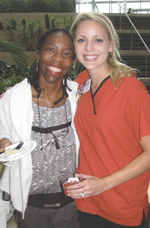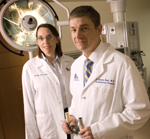|
|
|

|
MUSC a destination therapy site for heart patients
|
By Dawn Brazell
Public Relations
A group of nurses crowd around Janette Rice in the Ashley River Tower
auditorium as she eats a big slice of cake.
Everyone’s grinning.
 “I’m just
thankful for what everyone did for me,” said Rice, the belt around her
waist the only visible sign of her Aug. 25th surgery to implant a
HeartMate II. The belt houses the controller and battery for her
mechanical, circulatory pump that’s giving her a second chance at life. “I’m just
thankful for what everyone did for me,” said Rice, the belt around her
waist the only visible sign of her Aug. 25th surgery to implant a
HeartMate II. The belt houses the controller and battery for her
mechanical, circulatory pump that’s giving her a second chance at life.
Janette Rice, left,
enjoys a reunion with Mary Katherine Melroy, an occupational therapist,
at a reception celebrating MUSC's Joint Commission certification.
“We discussed it and decided I didn’t have a choice. They said that it
could add another 10 years to my life. Who’s going to say, ‘no,’ unless
you don’t like living,” said Rice, smiling at her friend who took her
to Walmart earlier for a little retail therapy. It’s the first time
since her surgery to address her congestive heart failure that she’s
really felt up to getting out.
Before the implant, she was falling asleep at work and would walk a few
feet and have to stop to rest. Now she’s doing treadmill and elliptical
workouts as part of her rehabilitation as she awaits a heart transplant.
“I know God is the reason that I have the ability to receive this in my
lifetime at this time. The timing might have been off, but it wasn’t. I
was able to get this and be here laughing and talking with my friends,”
she said.
Timing is everything.
MUSC was selected to offer the revolutionary mechanical circulatory
support therapy as a bridge-to-transplant treatment option following
FDA approval of HeartMate II in 2008. The cake enjoyed Sept. 30 was in
celebration of MUSC receiving distinction from the Joint Commission as
a VAD (ventricular assist device) Center of Excellence. The HeartMate
II recently received FDA approval for use as final or destination
therapy for patients with end-stage heart failure who will not, for
various reasons, be receiving a heart transplant.
 Drs. Jennifer Peura
and Michael Toole are glad to see MUSC become a destination therapy
center for patients with advanced heart failure. Drs. Jennifer Peura
and Michael Toole are glad to see MUSC become a destination therapy
center for patients with advanced heart failure.
Jennifer Peura, M.D., in MUSC’s Division of Cardiology and medical
director of the VAD Program said she’s thrilled that more patients will
have access to this treatment, and that MUSC is on the list of a few
select centers across the nation approved to perform this destination
therapy. There are 80 centers across the nation that are Joint
Commission accredited for destination therapy. MUSC is the only center
in South Carolina and among eight centers in the Southeast.
The Joint Commission visited MUSC Sept. 22 and evaluated the
Ventricular Assist Device Program. The survey team visited
multiple sites at the Ashley River Tower including the ambulatory
clinic, 4 east, cardiothoracic ICU, operating rooms and the chest pain
center. Staff members were interviewed, HeartMate II patient
charts were reviewed and MUSC VAD Program performance data was
evaluated.
Surgically implanted, HeartMate II is a mechanical pump that has a
power cord or drive line that exits through the abdominal wall and is
connected to a computer called a controller. Patients must be connected
to power in order to run the pump. Typically the device uses
batteries during the day, and then can be plugged in to recharge at
night.
Matthew Toole, M.D., MUSC Department of Cardiothoracic Surgery and
surgical director of the VAD Program, performed the first HeartMate II
implant at MUSC in April 2009. Since that time, 11 other patients
have received the device.
Peura said HeartMate II can provide critical support for patients as
they wait for a donor heart. Because of its small size and
portable external components, the device allows patients to be
discharged from the hospital and live practically normal lives.
This compares to how it used to be with older devices that had large,
external-power systems, requiring patients awaiting a heart transplant
to remain in the ICU.
With MUSC’s recent designation as a destination therapy site, the
hospital also will be helping more people experiencing advanced heart
failure, but who are too ill and are ineligible for heart transplant,
she said.
“We were told by the Joint Commission surveyor that the sincerity and
enthusiasm exhibited by staff members throughout out program was
remarkable,” Peura said. “I believe this was a key factor in our
excellent evaluation and the foundation of our success as a VAD
Program. I feel proud to work among such a skilled and dedicated team.”
Rice would agree. She finishes her cake among a group of support staff
and nurses who have stopped by to congratulate her on how well she
looks.
“I made a lot of new friends here.”
HeartMate II
- It is smaller than
previously approved LVADs (left ventricle assist device) and can be
used for a broad range of advanced-stage heart failure patients,
including women.
- The device can
pump up to 10 liters of blood per minute, covering the full output of a
healthy heart q It is implanted alongside a patient’s native heart and
takes over the pumping ability of the weakened heart’s left ventricle.
- The HeartMate II
is used as a bridge-to-transplant treatment and as destination therapy
for advanced heart failure patients who are ineligible for a heart
transplant.
Friday, Oct. 8, 2010
|
|
|



 “I’m just
thankful for what everyone did for me,” said Rice, the belt around her
waist the only visible sign of her Aug. 25th surgery to implant a
HeartMate II. The belt houses the controller and battery for her
mechanical, circulatory pump that’s giving her a second chance at life.
“I’m just
thankful for what everyone did for me,” said Rice, the belt around her
waist the only visible sign of her Aug. 25th surgery to implant a
HeartMate II. The belt houses the controller and battery for her
mechanical, circulatory pump that’s giving her a second chance at life.